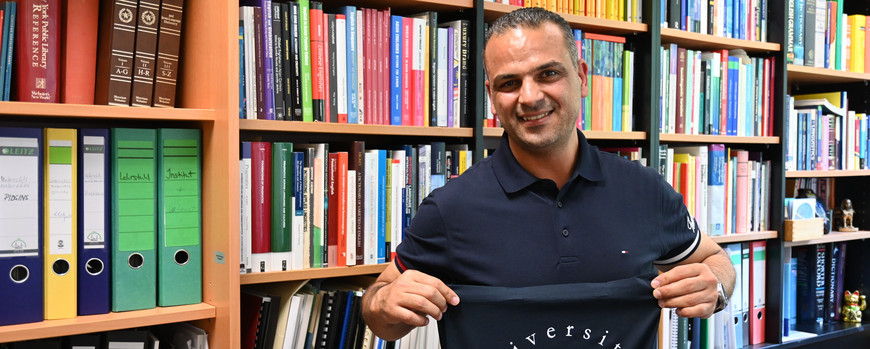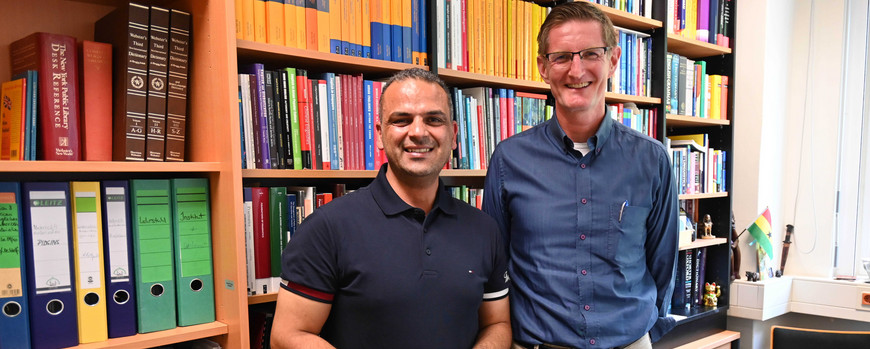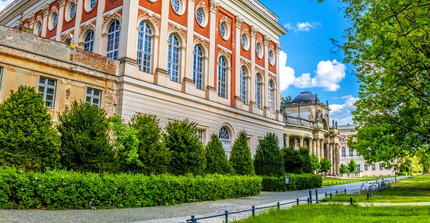Dr. Sami Al-Hasnawi
UP Reconnect Guest: Dr. Sami Al-Hasnawi
Visiting from: Iraq
Home Institution: University of Al Qadisiyah
Host at the UP: Prof. Dr. Hans-Georg Wolf
Institute at the University of Potsdam: Institute for English and American Studies
Time of the visit: August 2023
Sami Al-Hasnawi studied English language and Literature, Translation and Applied Linguistics in Iraq. In 2017 he finished his Ph.D. in Applied Linguistics at the University of Southampton in England. In this interview, he tells us more about his focus in research “English as a Lingua Franca” and talks about his own cultural influence towards this topic.
Dear Sami, your first stay at UP was two years ago, was what your first connection?
My first connection with the University of Potsdam was through Prof. Wolf just to apply for a postdoctorate scholarship, since my country allowed me to do one year abroad. I already graduated from the UK, from the University of Southampton, so I tried to change my mindset in terms of high education and go to Germany and see how the education is similar or different to British universities. I tried to contact some people, and one of them was Prof. Wolf and I think within the same week I got to apply.
How have you worked together since then?
Thankfully, he welcomed the idea of postdoctoral scholarship and sent me the invitation. But after that, because of the Corona crisis and things like these, we wanted something different which was first a DAAD scholarship, that was two years ago. Then I came here to do some research about English as a lingua franca, cultural issues, misunderstandings and interculturality. At the moment we are working on book chapters for a book that Prof. Wolf is editing with a professor, and I submitted my first chapter to Prof. Wolf in July. And now for this visit, we have a new kind of application project, which is due to be submitted by the end of October. We agreed about initial ideas or thoughts to go with: we try to invest a particular idea related to food culture or something related to world Englishes and how this could be represented in the food domain and anything related to interculturality through food culture. While I was thinking and writing the chapter that I submitted in July, I tried to take things further and think about decolonizing, for example, applied linguistics.
Could you please elaborate on that?
We already have things anglophone-based, like certain standards, stereotypes, etc. I tried to search more about pragmatics and why we always think about, for example, politeness according to the anglophone cultures. I asked myself, why don’t we think about politeness from a broader perspective and think about interculturality or transculturality within pragmatics and try to search about this? Nowadays we are sitting here, but there is no one from any anglophone countries so why do we need to follow, for example, politeness already based on the American or British standards? Why don’t we think about things shared among people who are neither American nor British? These are just small things, that might become bigger and bigger when you read and discuss with professors.
Could you give us an insight into your current research?
Since my Ph.D., I am working on English as a lingua franca and how this could be represented across university disciplines. For example, I think about how English by itself as a lingua franca is different. We cannot expect English as a lingua franca as one entity that is called an "International English". I try to see even the different Englishes we have, there are differences and how these differences might be similar in some respects. For instance, in what way academic Englishes are similar or different within the university context. After that, I tried to go beyond word-based communication, to see how the image in our communication might serve to multiply the meaning we are trying to get. Going behind the word base communication, I think about trans-semiotic communication, to combine the word, the image, and the symbol and adapt non-linguistic symbols, how they collaboratively work to give us a particular message or meaning.
After all these, when I wrote the chapter to submit to Prof. Wolf, I wanted to see how trans semiotic communication and transculturation communication might serve to think about decolonizing English, since now the transcultural and translingual communication we are always going to is something different from the English norms, that we used to study or to teach our students. So, I wrote a chapter about decolonizing English through English as a lingua franca.
How do you envision the role of English in promoting international collaborations and also in knowledge-sharing?
I think you agree that having one common shared language is something good and important for us as people, for knowledge transmission. But this is at the same time something against linguistic rights. For example, for someone like me, coming from an Arabic background, I like to see my language represented somewhere. So as important as it is, to have English as a global lingua franca, at the same time I need to see other languages to be firm with the world and you can imagine how happy you feel when you see your language next to others.
For example, in Turkey, in Izmir, there is a law to minimize the Arabic language to 40%, to keep the national language. I don’t comment badly on how they defend the right to their language, but at the same time that is not the world now. The world now is a collage, there are different pieces coming from different origins to shape the world that we are getting in. That’s why you cannot imagine a “pure” Turkish, or “pure German”, or “pure Arabic”, “pure Iraq”, etc. We are made of different things.
And in what way have your background and experience from Iraq influenced your approach to study English and conducting research and are there any specific cultural aspects that have shaped your perspective?
You reminded me of a section called reflexivity, which I wrote in my dissertation, where I compared how Sami was before getting to Southampton to study: Before joining my Ph.D. I was so stiff with my students to follow the British and American rules in terms of, phonology, grammar, etc. Since before joining my Ph.D., I used to be taught, this is how English is, this is how people from different backgrounds speak English, they are all copy pasted from British or American culture. But immediately when I landed at Heathrow, I realized the world is different from what I used to be taught, there is no pure English as my teachers used to teach me. At Southampton University I was lucky to be supervised by Jennifer Jenkins, she is one of the pioneers in this field and in the courses I learned something different about the sociolinguistics of English. And in that part in my reflexivity I said, this is where I got a new Sami, someone else who is defending and saying, no, English is different from the British or the American one. This is the foundation for my new career in research.
You mentioned earlier you were interested in differences in education for example in the UK, in Germany and in Iraq. What would you say are the main big differences?
I already worked with the British Council for a very big project led by the University of Southampton. In January 2022 I was there to deliver my findings to the British Council team and some other scholars and they asked me the same: “Which kind of picture do you have in mind as related to education in Iraq and how do you see things in England for example?” The idea is that no change is possible by one man like me. In Iraq we have a top-down-policy, so the ministry decides everything for you as a teacher, and as a student, to go through. The problem is with the foundation of that policy, they follow the British Council on what they decide to teach us as people in Iraq. They always trust the British Council when they set us a particular textbook to teach our students without any critical space for us as teachers to say: this is wrong, this is irrelevant, or this can partially benefit our students. When I went through the book, that was decided by the Ministry of Higher Education, for example, the title of the book “English for Iraq” does not really match with the content. The “English for Iraq”, the most relevant thing that I found, is the changed names: people are called Fatimah, Leyla, Mohammad, or Ahmed instead of John or Julia, etc. Taking the local names from the Arab culture – that is “English for Iraq”. Most of the content is still based on imaginative social hierarchy: it suggests that when you want to be successful, famous, and have a good future, you need to go to America or Europe. More uneducated people might believe that: Success is related to America, for example, or if you have a European identity you are going to achieve all your dreams. I tried to comment on that when the British Council was the audience for me, but no one really listened to that in Iraq. You can imagine, that if we are still setting up the minds in this way, we are still fuelling particular kinds of stereotypes for Iraqi people.
And you cannot expect that reformation process in a country like Iraq when they don’t give you the space to criticize the content.
"This was a very easy and convenient way to reconnect." – Prof. Dr. Hans-Georg Wolf
What are the advantages being here in Germany for the project and what do you think about UP Reconnect?
When you first change your place, I think you change your mind. When I come for a meeting, for example, you will force yourself to have the best come out of your mind. This is also one of the things I always imagine when I go to see people with higher qualifications: I need to think about more and more options in my research and things to go deeper to convince people about my ideas. In my opinion, this is how scholarships and research may become better. The other point is the kind of resources you might be offered. When I work in Iraq, sometimes I need new resources, and newly published articles that I cannot get because I need to pay for access.
I always try to chase certain funds to go to conferences or to attend any meetings. Apart from the financial assistance it makes you feel invited. And getting an invitation from a place like the University of Potsdam is something positive for any scholar to write down in their CV. And frankly speaking, it is really a good chance to shape the future.
Prof. Dr. Wolf: Without the program UP Reconnect, Sami wouldn’t have come; he would have to wait for new funding from any of these other programmes. So this was a very easy and convenient way to reconnect.
What advice would you give to other international researchers to make the most of their time here?
I think I need someone to advise me first (laughs). But actually, I already did. You always see the world through, for example, your family. When I brought my son here, who is looking for a good university to study, I advised him to have a look at the University of Potsdam. I tried to let him see what I expect from a university like Potsdam. So, I already advised a new generation, represented by my son. And for scholars, I think this is a good chance for someone to start a new step in his career or research to think about the University of Potsdam.
Thank you for the interesting interview and we wish you all the best for the future!



